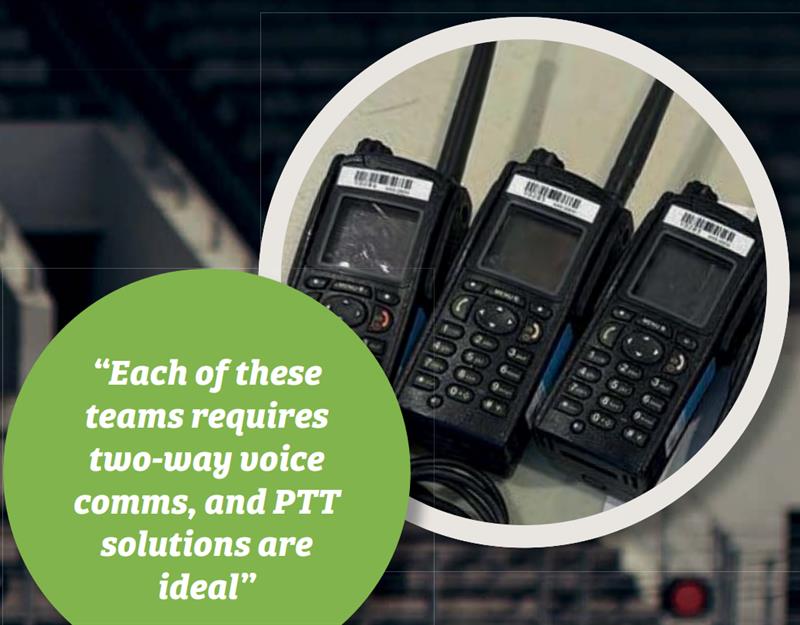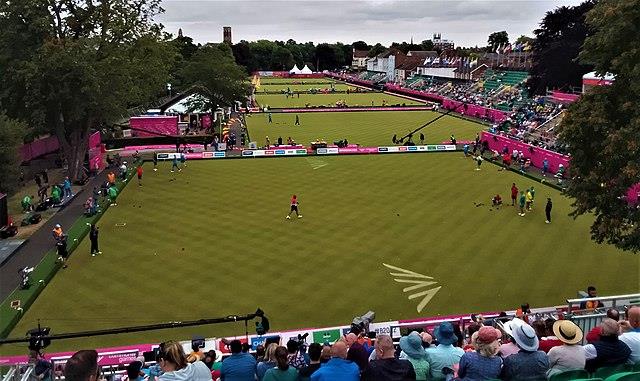For sheer excitement, it is tough to beat the pageantry and action at massive sporting events such as the Olympics or World Cup games. These mega events draw vast audiences and place an immense burden on radio systems supporting public safety, the public mobile cell systems, event communications, and even the licence-exempt spectrum we all take for granted.
For the summer of 2022, I travelled to Birmingham in the UK to discover just what it takes to make one of these mega-sporting events a safe place to visit and compete. The occasion was an opportunity to embed myself in the radio communications team, supporting the Birmingham 2022 Commonwealth Games. The Games brought together top athletes from across 72 Commonwealth countries to compete for the top honours in their sports. Given the unique wireless communications challenges these events pose, what is required to make them a success?
IOC practices
While terms vary from event type to event type, major sporting events such as the Birmingham 2022 Commonwealth Games follow a template that matches the operations of the International Olympics Committee (IOC). These events are structured carefully to support large scale, with delegated functional areas that report to a supervisor (discussed below). The Games operate under the leadership of an organising committee (OC). The competitions organised by the OC are held at venues scattered across the host’s region.
In the case of the Birmingham 2022 Commonwealth Games, 15 venues spanned the West Midlands of England, from Wolverhampton to Coventry. Within each venue, functional teams take responsibility for the activities required to make a safe and successful Games experience. Units include security, medical, catering, sports operations, and more. Each of these teams requires two-way voice communications, and push-to-talk solutions are ideal for rapidly disseminating status across all team members.

In fact, a big part of preGames planning is the development of fl eet maps that allocate talkgroups and speaker callsigns for these one-to-many communications channels used at the venue. Talkgroup design and training Talkgroup planning is essential to avoid collisions when too many members use a single talkgroup at a single moment. This principle applies to all push-to-talk group communications technologies: TETRA, DMR and Push-to-talk over Cellular (POC).
For the Birmingham 2022 Commonwealth Games, the Organising Committee crafted a set of fleet maps that allocated functional groups using a strategy designed to reduce contention for time on the talkgroup. The design of talkgroups at Games has an additional component that must be factored in: confidentiality. Sensitive anti-doping operations require an ability for discrete communication that remains private, even though the conversation may occur on a trunked radio system.
To that end, dedicated talkgroups must be provisioned and operated on trunking systems that assure privacy for communications. The design of talkgroups is also a critical factor in ensuring the safety of visitors and competitors at the games. Event organisers must structure mega-sporting event talkgroups to maximise the potential for effective communication flows during stressful times.
FIND OUT MORE: BT BRINGS 5G BROADCAST NETWORK TO BIRMINGHAM COMMONWEALTH GAMES
As demonstrated during the Manchester Arena bombing in 2017, issues with communications can contribute to disastrous results. It is vital, for instance, that all staff who are issued two-way communications devices must be trained on the use of the equipment and the protocols for speaking. It seems obvious, but these skills are not ones that people outside the military and emergency services use.
As part of its preparation for the Birmingham 2022 Commonwealth Games, the OC required all staff to undergo two-way communications device training. This blend of online training and ‘trainthe-trainer’ programmes helped staff understand the basics, such as talkgroup speech etiquette and how to transmit an emergency message. All staff equipped with radios were trained to understand how to send an urgent message during a crisis when normal talkgroup channels were fully loaded.
Advanced training, including simulation exercises and venue-specific training classes, provided key personnel with a strong foundation in case of crisis. At the Manchester Arena, security staff abandoned attempts to communicate concerns about a suspicious person because they could not get through. This meant that vital information never made it to the control room.
By ensuring Birmingham 2022 staff understood how to communicate Events critical messages during times of congestion, the OC took concrete steps towards avoiding any potential failure of communication. Portable radio deployments As the Games preparation shifts from the planning phase to delivery, the challenge of obtaining, programming, distributing and collecting communications devices becomes daunting. For the Birmingham 2022 Commonwealth Games, the OC turned to German communications specialist Riedel Communications to solve the problem.
The company is an expert at supplying complex communications solutions for large-scale public events such as the Olympics, the World Cup, Formula 1, Eurovision, and others. Riedel Communications’ extensive inventory of DMR and TETRA assets includes base stations and portable radios. For the Birmingham 2022, nearly 7,000 portables had to be configured, distributed and collected over the course of six weeks. Meeting the challenge of a large-scale, transient deployment is tough.
Once on the ground in Birmingham, the Riedel Communications team worked long hours with few, if any, days off to meet the demanding project’s requirements. Even before the devices arrived at the local Birmingham warehouse, staging staff at Riedel’s headquarters provisioned radios and filled shipping pallets with cases of components destined for the Games’ 15 venues including bowling at Victoria Park in Leamington Spa (pictured below, credit: Wikimedia Commons/ Sirhissofloxley).
Each venue staffed control rooms for command and control operations during the Games. Representatives from each functional area were present in a primary control room, along with senior leadership from the emergency services organisations responsible for community safety.

At Birmingham 2022, the Organising Committee designed the control rooms to include a unique intercom system, again developed by Riedel Communications. The company’s Artist system provides a decentralised digital intercom network that distributes audio signals to user stations around a venue. In a Games environment, the system is interfaced with a set of trunked mobile radio sets installed in a rack. Each radio in the rack is set to a specific event’s functional area talkgroup. The Artist system matrix distributes the two-way communications flows to and from a radio’s microphone interface over an Ethernet local area network to thin panels mounted at each operator’s position in the room.
The flexibility of the system is remarkable. Any operator at any position can select one or more talkgroups to monitor or transit over. A venue manager, for example, may listen to the sports operations talkgroup at a low volume but have the primary venue operations talkgroup set at a high volume. The manager can push a button on any talkgroup and transmit commands.
The system is complex, but the care taken in design, deployment and training is well worth the eort. With the flexibility of a matrixed two-way communications system, a complex game operation can be safely decomposed into functional areas while retaining the ability for any team member to join any communications channel as needed.
Two significant benefits of the Artist system are cost and noise reduction. Because each operator has a single Ethernet-connected panel as a radio interface that serves many talkgroups, the OC avoided the cost of leasing multiple portable radios at each operator position. The savings in money, time and table space were considerable. But a huge advantage was also the ability of an operator to use a single headset to monitor multiple talkgroups while controlling individual talkgroup sound volume. The result is a quiet control room with no extra radios cluttering the desktop.
PoC plays a role
A notable addition to the communications ensemble at the Birmingham 2022 Commonwealth Games was Push-to-talk over Cellular (PoC). While Games venue operations depended on dedicated trunked DMR or TETRA radio systems operating on frequencies assigned for the Games by Ofcom, hospitality and transportation functional areas moved to PoC services operating on commercial mobile networks.
This approach allowed flexible coverage well beyond the reach of fixed venue base stations, allowing Games staff at hotels, airports and train stations full access to the communications platform. But as valuable as PoC is, the technology poses a risk that limits deployment in mission-critical aspects of Games operations.
Data congestion or failure of a public cellular network can make PoC unreliable. For example, authorities may shut the cellular network down after a major public safety incident. Should such a crisis occur, security staff must be able to communicate without interruption to co-ordinate safe evacuation or shelterin-place strategies. That fundamental requirement makes PoC unsuitable for venue-based operations. Well-designed and operated two-way group voice communications play a critical role in Games operation and safety.
The key to success is solid preparation that factors in spectrum management, radio inventory, base station site plans, logistics and staffng. The resulting communications fabric becomes a foundation for delivering a safe and satisfying fan experience. Ultimately, that success translates to brand protection for the organisation behind a mega-sporting event and the sponsors that make the event possible. It is an investment with an incalculable return.




